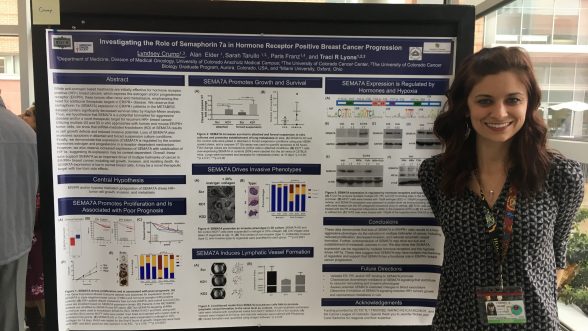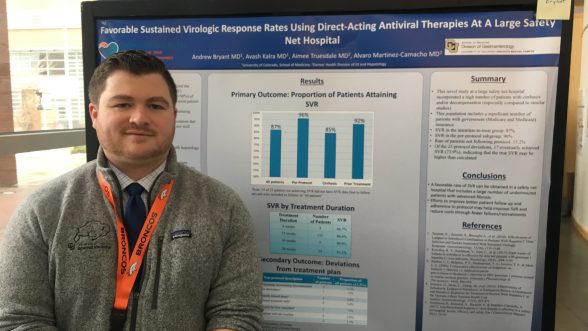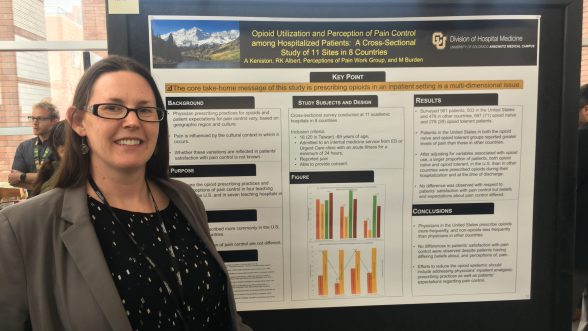Battling breast cancer, hepatitis C and the nationwide opioid-addiction crisis were just three of the research goals highlighted as part of the Department of Medicine’s sixth annual Research Day on the University of Colorado Anschutz Medical Campus.
Gathered in the Fulginiti Pavilion on April 6, the department within the CU School of Medicine recognized 22 students, faculty and staff for their outstanding research achievements as part of the event. Focused on showcasing the diverse accomplishments at CU Anschutz, the event encourages discussion and collaboration across the the Department of Medicine’s multiple disciplines.
This year, a diverse panel of faculty judges selected 22 outstanding abstracts – all submitted by Department of Medicine students, postdocs, fellows and junior faculty. The researchers were then invited to present their projects at Research Day, said Jennifer Kemp, director of the Department of Medicine Research Office.
“The Research Day poster session presents a unique opportunity for our researchers to present their latest work to a broader audience than is typically found at a more specialized conference,” Kemp said. “This broad audience brings the potential to spark new ideas and catalyze new collaborators in different fields.”
Cancer biology
 Lyndsey Crump shares her research in cancer biology.
Lyndsey Crump shares her research in cancer biology.
Lyndsey Crump, a third-year student in the Cancer Biology
program in the Graduate School, works in Traci Lyons’s lab. Crump has been exploring how signaling proteins can affect breast cancer progression. Specifically, she has looked at SEMA7A (Semaphorin 7A) and how its presence may indicate a worse prognosis.
“I want to try to help people,” Crump said of her passion in cancer biology. “One day I want to see this lab work to translate to clinical work, to give patients another potential course of treatment.”
Hepatitis C and public health
 Andy Bryant, MD, studies hepatitis C in special populations.
Andy Bryant, MD, studies hepatitis C in special populations.
Andy Bryant, MD, is an internal medicine resident at CU Anschutz studying the treatment of hepatitis C in a “safety net” population, or those who are either uninsured or have Medicare or Medicaid.
“Until this study, this population was overlooked,” said Bryant as he walked onlookers through his research. “Unfortunately, these people usually come in a lot sicker than those with traditional insurance. This means that their prognosis isn’t very good.”
Recent studies have helped underscore the potential for a new drug (DAA) that can cure hepatitis C. Originally, Medicaid and Medicare did not cover this drug, but Bryant’s findings help show the long-term potential savings of administering DAA.
Opioid prescribing habits
Angela Keniston, MSPH, an instructor in the department of hospital medicine, studies the prescribing habits of health care providers across the world.
 Angela Keniston researches cultural opioid prescribing habits.
Angela Keniston researches cultural opioid prescribing habits.
“Specifically, we wondered, do doctors in the United States prescribe opioids more?” Keniston said. “The answer, one we’ve all suspected, was yes.”
In conjunction with her study, Keniston also looked into cross-cultural patients’ perceptions of pain across cultures.
In the long run, Keniston would like to help doctors understand their patients’ expectations of pain, and ultimately change prescribing habits. “Pain is a normal experience,” she said. “We need our providers to shape the conversation with patients to help curb this prescribing epidemic in our country.”




